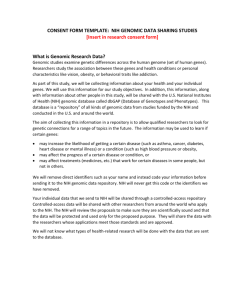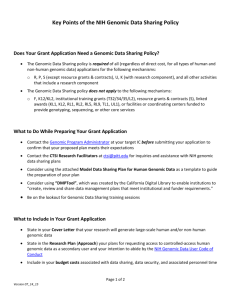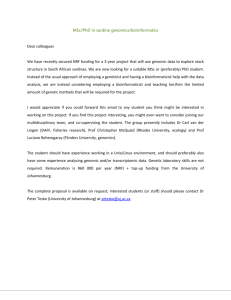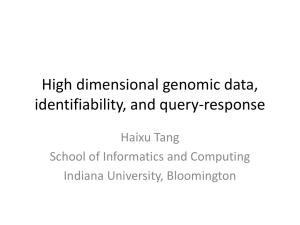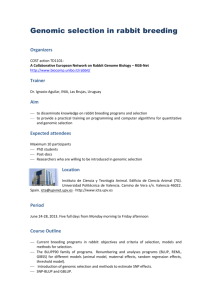Ethical, Legal, and Social Implications (ELSI) of Genomic Research
advertisement
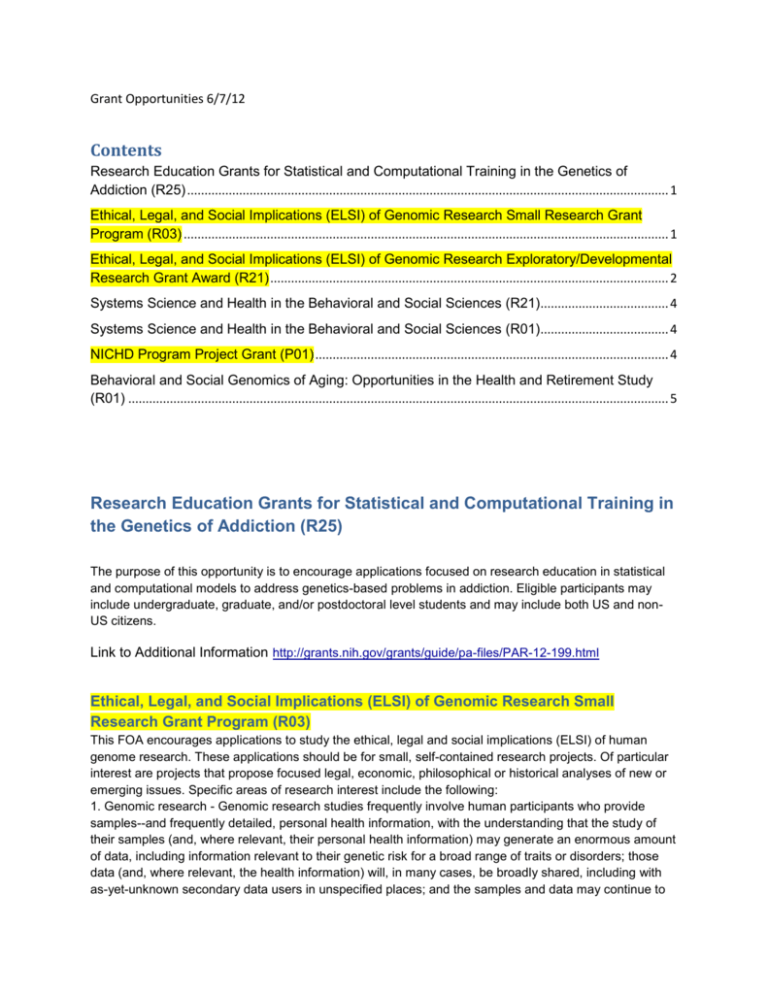
Grant Opportunities 6/7/12 Contents Research Education Grants for Statistical and Computational Training in the Genetics of Addiction (R25) ........................................................................................................................................... 1 Ethical, Legal, and Social Implications (ELSI) of Genomic Research Small Research Grant Program (R03) ............................................................................................................................................ 1 Ethical, Legal, and Social Implications (ELSI) of Genomic Research Exploratory/Developmental Research Grant Award (R21) ................................................................................................................... 2 Systems Science and Health in the Behavioral and Social Sciences (R21)..................................... 4 Systems Science and Health in the Behavioral and Social Sciences (R01)..................................... 4 NICHD Program Project Grant (P01) ...................................................................................................... 4 Behavioral and Social Genomics of Aging: Opportunities in the Health and Retirement Study (R01) ............................................................................................................................................................ 5 Research Education Grants for Statistical and Computational Training in the Genetics of Addiction (R25) The purpose of this opportunity is to encourage applications focused on research education in statistical and computational models to address genetics-based problems in addiction. Eligible participants may include undergraduate, graduate, and/or postdoctoral level students and may include both US and nonUS citizens. Link to Additional Information http://grants.nih.gov/grants/guide/pa-files/PAR-12-199.html Ethical, Legal, and Social Implications (ELSI) of Genomic Research Small Research Grant Program (R03) This FOA encourages applications to study the ethical, legal and social implications (ELSI) of human genome research. These applications should be for small, self-contained research projects. Of particular interest are projects that propose focused legal, economic, philosophical or historical analyses of new or emerging issues. Specific areas of research interest include the following: 1. Genomic research - Genomic research studies frequently involve human participants who provide samples--and frequently detailed, personal health information, with the understanding that the study of their samples (and, where relevant, their personal health information) may generate an enormous amount of data, including information relevant to their genetic risk for a broad range of traits or disorders; those data (and, where relevant, the health information) will, in many cases, be broadly shared, including with as-yet-unknown secondary data users in unspecified places; and the samples and data may continue to be used for many years into the future, perhaps even indefinitely. In the context of earlier, more traditional, and more circumscribed genetics studies, the benefits and risks of the research could for the most part be framed and handled through a relatively routine informed consent process accompanied by discrete policy reforms or the recent enactment of a law prohibiting genetic discrimination in a particular setting). Such approaches to participant protection, however, have not always been adequate for genomic studies, which can be significantly more complex. Thus, it is necessary to develop, implement, evaluate, and continuously refine innovative mechanisms and policies that continue to recognize participants' interests in the privacy, disposition and use of the data, while simultaneously obtaining the scientific advantages that come from broad access to genomic research data. 2. Genomic health care - The availability of personalized genomic information, coupled with rapid changes in how health information is collected, stored, accessed, transferred, and used, promises to revolutionize health care. In order to fully realize this potential, genome-based health interventions that take advantage of advances in information and knowledge, as well as advances in communication technologies, must be developed. To ensure that these new interventions are safe and effective, their impact on individuals, their families, their communities and society more generally must be addressed and understood. 3. Broader societal issues - The ongoing evolution of genomic research and health care requires a continuing analysis of the normative underpinnings of beliefs, practices and policies regarding research, health and disease. In addition, as personal genomic information permeates many aspects of society, it will have profound implications for how we understand ourselves as individuals and as members of families, communities, and society, and even for how we understand what it means to be human. Longheld beliefs about the continuum between health and disease may be transformed, as will concepts of free will and responsibility. These conceptual shifts may have implications for current approaches to research, health and social policies, and will require both careful study and the development of practical mechanisms to translate the findings of these studies into language and formats that are relevant and useful to those involved in the development and implementation of these policies. 4. Legal, regulatory, and public policy issues - New legal and regulatory approaches need to be crafted in anticipation of or in response to rapid developments in genomic research and genomic health care. These approaches will need to be sensitive to the ways in which new genomic technologies and information are integrated into society. They also will have to adapt to the challenges inherent in attempts to maintain confidentiality and privacy in a new era of genomic information coupled with revolutionary changes in information technology. In addition, policy-makers will need to revisit the issues of autonomy and ownership that are evolving as society changes. Research will be needed to explore the effects of existing policies and regulations and to provide data to inform the development of new policies and regulatory approaches. CFDA 93.172, 93.866, 93,865, 93.113 http://grants.nih.gov/grants/guide/pa-files/PA-11-249.html Ethical, Legal, and Social Implications (ELSI) of Genomic Research Exploratory/Developmental Research Grant Award (R21) This FOA encourages applications from institutions/organizations that propose to study the ethical, legal and social implications (ELSI) of human genome research. These applications should propose exploratory or novel studies that break new ground or extend previous discoveries toward new directions or applications. Of particular interest are studies that explore the implications of new or emerging genomic technologies or novel uses of genomic information. Specific areas of research interest include the following: 1. Genomic research - Genomic research studies frequently involve human participants who provide samples--and frequently detailed, personal health information, with the understanding that the study of their samples (and, where relevant, their personal health information) may generate an enormous amount of data, including information relevant to their genetic risk for a broad range of traits or disorders; those data (and, where relevant, the health information) will, in many cases, be broadly shared, including with as-yet-unknown secondary data users in unspecified places; and the samples and data may continue to be used for many years into the future, perhaps even indefinitely. In the context of earlier, more traditional, and more circumscribed genetics studies, the benefits and risks of the research could for the most part be framed and handled through a relatively routine informed consent process accompanied by discrete policy reforms or the recent enactment of a law prohibiting genetic discrimination in a particular setting). Such approaches to participant protection, however, have not always been adequate for genomic studies, which can be significantly more complex. Thus, it is necessary to develop, implement, evaluate, and continuously refine innovative mechanisms and policies that continue to recognize participants' interests in the privacy, disposition and use of the data, while simultaneously obtaining the scientific advantages that come from broad access to genomic research data. 2. Genomic health care - The availability of personalized genomic information, coupled with rapid changes in how health information is collected, stored, accessed, transferred, and used, promises to revolutionize health care. In order to fully realize this potential, genome-based health interventions that take advantage of advances in information and knowledge, as well as advances in communication technologies, must be developed. To ensure that these new interventions are safe and effective, their impact on individuals, their families, their communities and society more generally must be addressed and understood. 3. Broader societal issues - The ongoing evolution of genomic research and health care requires a continuing analysis of the normative underpinnings of beliefs, practices and policies regarding research, health and disease. In addition, as personal genomic information permeates many aspects of society, it will have profound implications for how we understand ourselves as individuals and as members of families, communities, and society, and even for how we understand what it means to be human. Longheld beliefs about the continuum between health and disease may be transformed, as will concepts of free will and responsibility. These conceptual shifts may have implications for current approaches to research, health and social policies, and will require both careful study and the development of practical mechanisms to translate the findings of these studies into language and formats that are relevant and useful to those involved in the development and implementation of these policies. 4. Legal, regulatory, and public policy issues - New legal and regulatory approaches need to be crafted in anticipation of or in response to rapid developments in genomic research and genomic health care. These approaches will need to be sensitive to the ways in which new genomic technologies and information are integrated into society. They also will have to adapt to the challenges inherent in attempts to maintain confidentiality and privacy in a new era of genomic information coupled with revolutionary changes in information technology. In addition, policy-makers will need to revisit the issues of autonomy and ownership that are evolving as society changes. Research will be needed to explore the effects of existing policies and regulations and to provide data to inform the development of new policies and regulatory approaches. CFDA 93.172, 93.866, 93.865, 93.173, 92.113, 93.853 http://grants.nih.gov/grants/guide/pa-files/PA-11-251.html Systems Science and Health in the Behavioral and Social Sciences (R21) This FOA encourages Research Project Grant (R21) applications from institutions/organizations that propose to develop basic and applied projects utilizing systems science methodologies relevant to human behavioral and social sciences and health. This FOA is intended to encourage a broader scope of topics to be addressed with systems science methodologies, beyond those encouraged by existing open FOAs. Research projects applicable to this FOA are those that are either applied or basic in nature (including methodological development), have a human behavioral and/or social science focus, and feature systems science methodologies. CFDA 93.837, 93.866, 93.273,93.286, 93.865, 93.121, 93.113, 93.859, 93.242, 93.361 Additional Contacts Additional contacts for each component are listed at http://grants.nih.gov/grants/guide/pa-files/PAR-11-315.html Systems Science and Health in the Behavioral and Social Sciences (R01) This FOA encourages Research Project Grant (R01) applications from institutions/organizations that propose to develop basic and applied projects utilizing systems science methodologies relevant to human behavioral and social sciences and health. This FOA is intended to encourage a broader scope of topics to be addressed with systems science methodologies, beyond those encouraged by existing open FOAs. Research projects applicable to this FOA are those that are either applied or basic in nature (including methodological development), have a human behavioral and/or social science focus, and feature systems science methodologies. CFDA 93.399, 93.837, 93.866, 93.273, 93.286, 93.865, 93.121, 93.113, 93.859, 93.242, 93.361 Additional Contacts Additional contacts for each component are listed at http://grants.nih.gov/grants/guide/pa-files/PAR-11-314.html NICHD Program Project Grant (P01) This FOA encourages innovative, multidisciplinary, interactive, and synergistic program project grant applications from institutions/organizations that propose to conduct research on reproductive, developmental, behavioral, social, and rehabilitative processes that determine the health or functioning of newborns, infants, children, adults, families, and populations. The purpose of the P01 mechanism is to encourage investigation of complex problems relevant to NlCHD's mission and to facilitate economy of effort, space, and equipment. Under appropriate circumstances, the collaborative research effort of a program project can accelerate the acquisition of knowledge more effectively than a simple aggregate of research projects without thematic integration. http://grants.nih.gov/grants/guide/pa-files/PAR-10-245.html Behavioral and Social Genomics of Aging: Opportunities in the Health and Retirement Study (R01) The Health and Retirement Study is a longitudinal, nationally representative sample of the United States population aged 50 years and older (plus spouses) with an oversample of African and Hispanic Americans and a total sample size of over 20,000). Using funds from the American Reinvestment and Recovery Act, the HRS is currently conducting genome-wide scans of DNA samples from approximately 20,000 participants, using the Illumina HumanOmni 2.5 Quad chip. It is anticipated that the genotype data for the first 13,000 subjects will be released to the public via dbGaP in the fall of 2011, with data from the remaining participants to be released by the end of 2012. This FOA encourages applications taking advantage of the newly available genetic data to advance our understanding of how genetic, behavioral, and psychosocial factors affect the health and well-being of older Americans. CFDA 93.866 http://grants.nih.gov/grants/guide/pa-files/PA-11-318.html

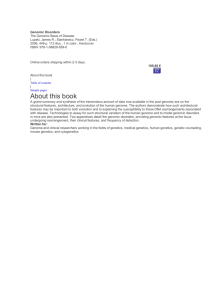
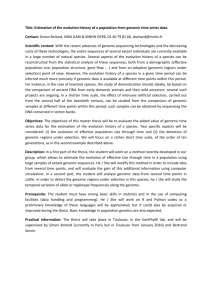
![[CLICK HERE AND TYPE TITLE]](http://s3.studylib.net/store/data/006976800_1-b48532bf46d7920073d6deb9d3a42a9f-300x300.png)
